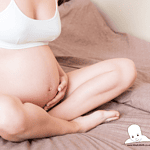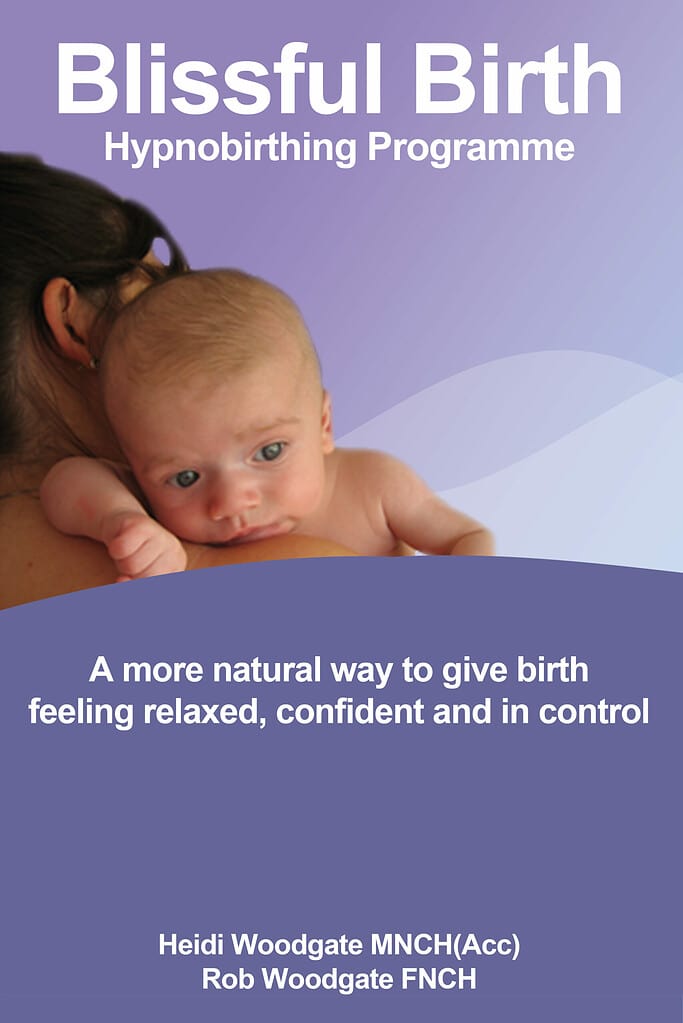As a cat owner, you may be aware that your feline friend has an incredible knack for picking up on your subtlest movements. They’re like little detectives, stealthily observing your every action with their keen senses.
From your late-night dance parties in the living room to those lazy stretches on the couch on weekends, it’s as if they possess an unspoken understanding of your every mood and moment.
But can cats sense pregnancy in humans?
Considering their remarkable observational skills, it’s only natural to wonder if your cat can detect the most extraordinary change that could happen to you – pregnancy.
Now, we’ve all heard those stories—your cousin’s cat acting extra clingy during her pregnancy, or your neighbour’s fur baby showing an unusual interest in her growing baby bump.
The countless stories about cats showing heightened attention and unique behaviours during pregnancy fuel the belief that there might be more to their intuitive abilities than meets the eye.
But are these anecdotes merely coincidental or do they hold a scientific basis?
We decided to do some digging to get to the bottom of it all, and we found some fascinating stuff! Let’s take a closer look.
Table of Contents
- Does my cat know I’m pregnant?
- Can cats smell pregnancy hormones?
- Cats are drawn to body heat
- Cats notice behavioural changes
- Cats are body language masters
- Can cats hear a baby’s heartbeat?
- How soon can cats sense pregnancy?
- How do cats act when they sense you’re pregnant?
- Prepare your cat for your baby’s arrival
- Final Thoughts
Does my cat know I’m pregnant?
There is no hard scientific evidence directly linking changes in a cat’s behaviour to their perception of your pregnancy. However, cats are known for their remarkable sensitivity and attentiveness to even the smallest changes in their environment.
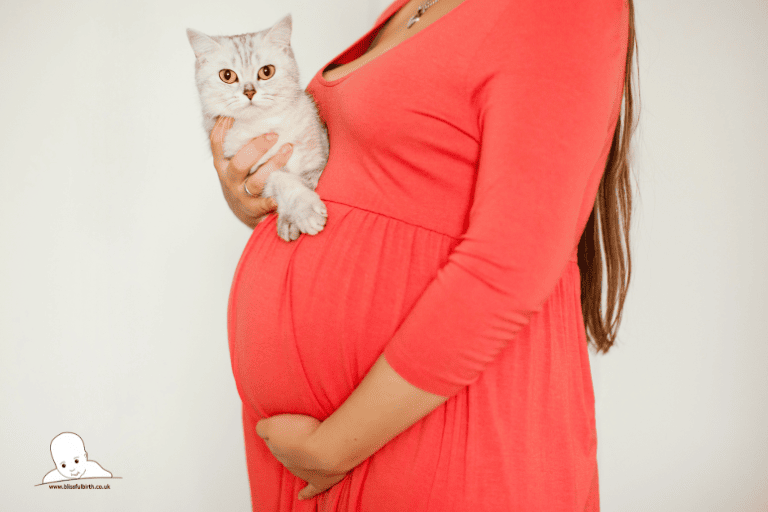
It is worth considering that cats may be able to recognize the significant physical and hormonal changes that occur during early pregnancy.
Despite the lack of scientific basis, the experiences shared by cat owners provide valuable insights into the potential connection between cats and their pregnant owners.
Can cats smell pregnancy hormones?
While there is no definitive scientific basis, it is believed that cats can detect the hormonal changes associated with pregnancy.
Cats have an exceptional sense of smell, with approximately 14 times more sensitivity than humans. With their keen sense of smell, they are able to pick up on subtle changes in body odour, including the scent variations caused by the increase in pregnancy hormones.
Although the specific ability of cats to smell pregnancy hormones remains uncertain, their remarkable sense of smell and their tendency to notice even the slightest changes in their environment suggests that they may be able to detect the shifts in their human companion’s scent during pregnancy.
However, further research is needed to fully understand the extent of their scent-sensing abilities in relation to pregnancy hormones.
Cats are drawn to body heat
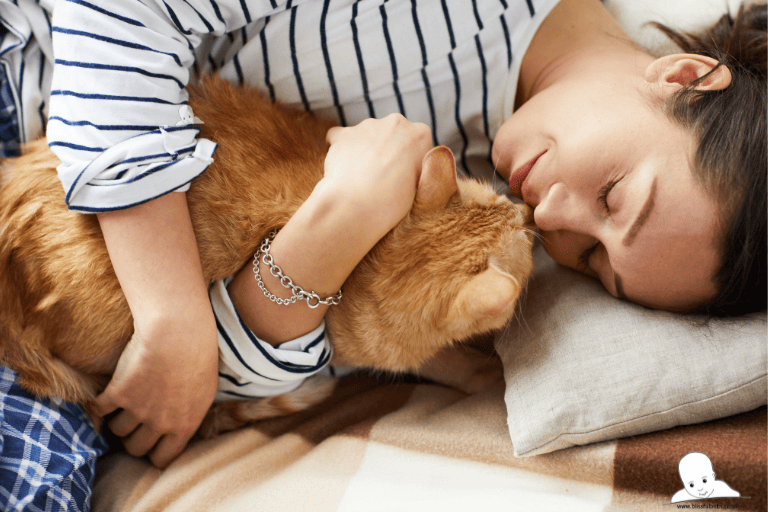
Cats’ ability to sense changes in human body temperature, particularly during pregnancy, is fascinating. One notable aspect is the metabolic boost that occurs when a woman is pregnant.
During pregnancy, the blood flow in the body increases, causing the metabolism to rise by approximately 20%. This increased metabolic activity leads to a higher basal body temperature in pregnant women.
Cats, with their naturally higher body temperature compared to humans, are attracted to warmth and seek out cosy places.
Hence, when a woman’s body temperature is slightly elevated during pregnancy, it’s not uncommon for her cat to be more inclined to snuggle and cuddle. You may find your furry companion wanting to lie on your belly, sit next to you more often, or even place their paw gently on your growing belly.
This heightened sensitivity to temperature changes allows cats to detect and respond to the warmth and comfort that a pregnant woman emits, offering them comfort and affection during this special time.
Cats notice behavioural changes
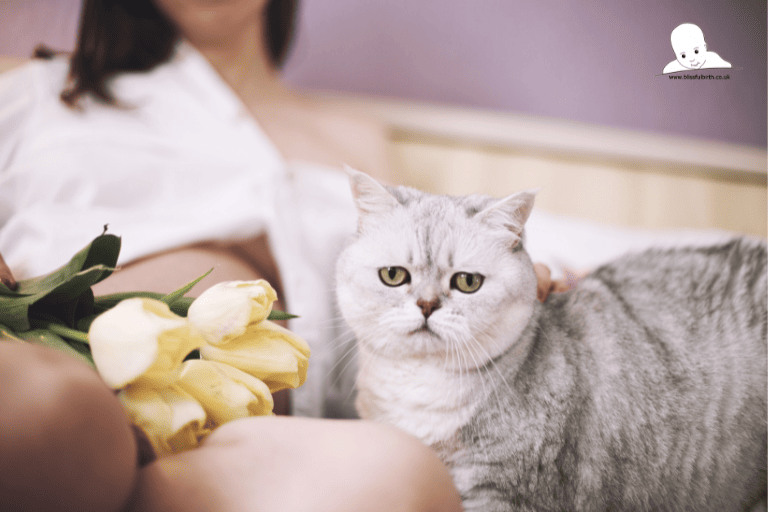
Cats are incredibly perceptive animals and can easily pick up on changes in human behaviour and daily routines, especially during pregnancy. These behaviour changes can signal to cats that the human body is undergoing significant transformations.
During pregnancy, hormonal fluctuations can have a profound impact on your emotions and behaviour. Cats, being observant companions, are likely to notice these shifts.
For instance, if you’re experiencing increased fatigue and find yourself needing more rest and sleep throughout the day, your cat will notice the changes in your daily routine. They may observe that you’re spending more time resting or taking naps, and they may adjust their behaviour accordingly, being more gentle or cuddly.
Similarly, the need for frequent bathroom breaks due to increased urination can also be noticed by your cat. They may become more attentive or curious when you go to the bathroom or follow you to the restroom.
And if you are worried or anxious about giving birth, then your furry pal will definitely pick up your mood.
In addition, the modification in your exercise routine or limitations in physical activities during pregnancy may be evident to your cat. They may observe that you’re not engaging in vigorous play or exercise sessions like before, and they may adapt their play behaviour accordingly. These changes in your daily routines will not go unnoticed by your cat.
Cats are body language masters
Cats are highly skilled at reading body language and can quickly notice when your movements become more awkward, and your posture shifts due to the physical changes in your body.
They are sensitive to alterations in your routine and environment, including your body language.
Cats possess a remarkable ability to detect subtle changes in human behaviour and body language, as revealed in a study conducted in 2020, and use them to predict future events.
Even if you may not consciously feel like you’re acting differently, your cat can still sense changes in the early weeks of your pregnancy.
Whether it’s your heightened anxiety levels during the anticipation of a pregnancy test result, your slower movements and fatigue caused by morning sickness, or the adjustments in your daily routines, cats will notice that something is different.
Can cats hear a baby’s heartbeat?
While cats have an exceptional sense of hearing, it remains uncertain whether they can specifically detect a baby’s heartbeat. Cats possess an additional fold on their ears that may enhance their ability to hear high-frequency sounds, allowing them to perceive sounds beyond our range.
In fact, cats have a superior hearing range compared to humans, being able to hear sounds up to 65,000 Hz. This means that it is possible for cats to hear the heartbeat of a baby if they are in close proximity to the mother’s belly and the sound is sufficiently loud.
However, the exact timing and effectiveness of their hearing capabilities in detecting a baby’s heartbeat remain unknown and require further scientific investigation.
While it’s intriguing to consider the possibility, there is currently no definitive scientific evidence confirming that cats can indeed hear a fetal’s heartbeat.
How soon can cats sense pregnancy?
Cats can sense pregnancy by detecting changes in hormone levels, body temperature, and body language.
But how soon can they sense it?
While every woman and cat may vary, it is suggested that cats can detect pregnancy in the first few weeks specifically 3 to 4 weeks into the pregnancy, even before the woman herself becomes aware of it.
However, if you suspect you might be pregnant, it’s always a good idea to take pregnancy tests or consult with a healthcare professional.
How do cats act when they sense you’re pregnant?
When cats sense that their owners are pregnant, they can exhibit various reactions and behaviours. While each cat is unique and their responses may differ, here are some common ways that cats may react when they sense their owner is pregnant:
Increased affection
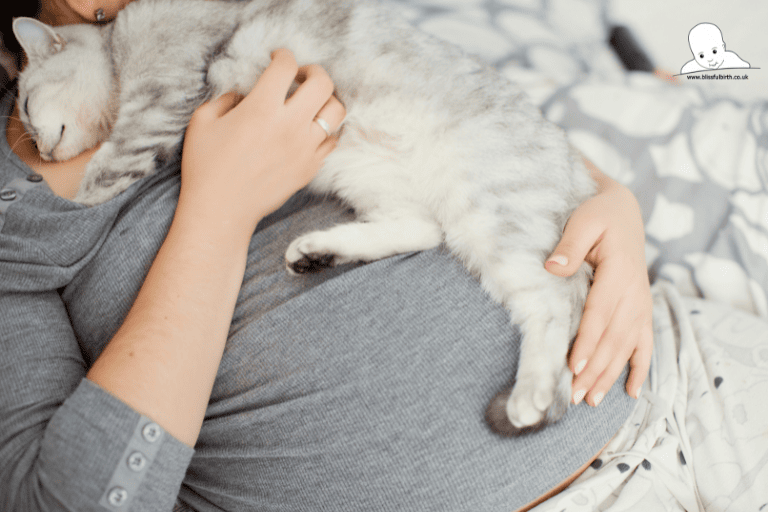
Cats may become more affectionate and seek out extra attention from their pregnant owner. They might rub against the belly, purr, or become clingy and cuddle more than usual.
Protective behaviour
Some cats may display protective instincts towards their pregnant owner. They might become more vigilant, keeping a watchful eye over their owner and staying close by.
Heightened sensitivity
Cats have a heightened sense of smell and can detect changes in their owner’s scent due to hormonal shifts during pregnancy. They may react to these changes by being more attentive or curious about the pregnant person.
Changes in behaviour
There may be changes in a cat’s behaviour as it adapts to the pregnancy. They might become calmer and gentler, especially if they were previously energetic or playful.
Alternatively, they may become more aloof or cautious, trying to avoid any potential harm to their pregnant owner.
Avoiding certain areas
It’s not uncommon for cats to avoid specific areas of the house once their owner becomes pregnant.
For example, they may stop sleeping on the bed or couch where you spend a lot of time. This behaviour could be due to their sensitivity to changes in your scent or a reaction to the changes happening in your routine.
Again, take note that every cat is unique, and their reactions may vary. If you notice any significant changes in your cat’s behaviour or have concerns, it’s advisable to consult with a veterinarian for guidance.
Prepare your cat for your baby’s arrival
Preparing your cat for the arrival of your new baby is an important step in ensuring a smooth transition for both your cat and your growing family.
Here are some valuable tips to help you prepare your cat for your baby’s arrival:
Gradual Introductions
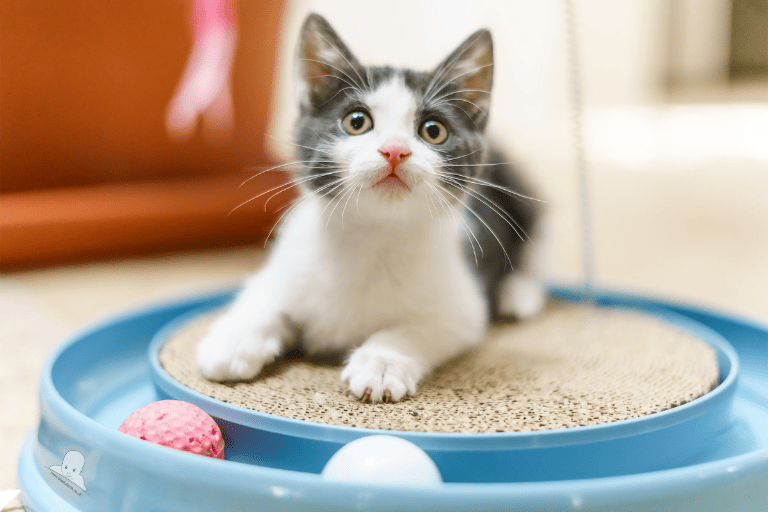
Start by gradually introducing baby items in your home. This allows your cat to become familiar with these new objects without feeling overwhelmed. Avoid sudden and drastic changes that may cause stress for your cat.
Exposure to Baby Sounds
Play recordings of baby sounds, such as crying or cooing, to make your cat familiar with these new noises. Gradual exposure to these sounds helps your cat adjust and reduces the likelihood of associating them with negative experiences.
Maintain Routine and Attention
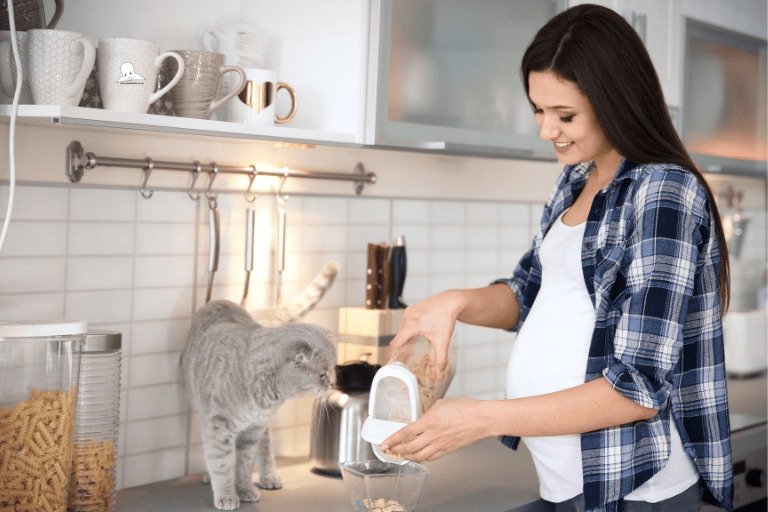
Stick to your cat’s regular feeding, play, and grooming routines as much as possible. Maintain quality time and attention with your cat to prevent feelings of neglect and ensure they still feel loved and cared for even after your baby arrives.
Final Thoughts
While we may never fully comprehend the extent of a cat’s awareness of pregnancy, it’s evident that they have a unique ability to sense changes in their surroundings.
By understanding and addressing their needs during this transformative time, we can foster a loving and inclusive environment that welcomes both our feline companions and our new bundle of joy.

